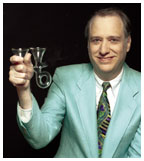Have an opinion about this issue of PAW? Please take a minute to click here and fill out our online questionnaire. It’s an easy way to let the editors know what you like and dislike, and how you think PAW might do better. (All responses will be kept anonymous.) |
April 20, 2005: A moment with...
J. Richard Gott III *73
(Denise Applewhite) |
Hoping to introduce a wider audience to Einstein’s theories of relativity, astrophysics professor J. Richard Gott III *73 argues in his 2001 book, Time Travel in Einstein’s Universe, that it may be theoretically possible to travel back in time — it may just require a supercivilization to build a time machine by twisting space and time. (Travel to the future is simpler.) Gott recently spoke to PAW’s Mark F. Bernstein ’83.
This year marks the centennial of Einstein’s special theory of relativity and the 50th anniversary of his death. How important is Einstein’s work in our understanding of the universe?
Einstein’s special theory changed our idea of space and time. Time magazine named him the most influential person of the 20th century. And the special theory has been checked many times and has passed all the tests.
Where did your own interest in time travel originate?
I was working on the geometry around cosmic strings, which are thin threads of energy that might be left over from the Big Bang. I found an exact solution to Einstein’s equations for the geometry around a single cosmic string, and then a solution for two cosmic strings passing each other. One particularly interesting property of this was that if the strings moved past each other fast enough, you could, in principle, loop around and come back in time, which is possible because space and time are curved. This solution joined other time-travel solutions found previously by Kip Thorne *65 at Cal Tech and Kurt Godel at the Institute for Advanced Study.
Is a time machine just a really fast rocket?
That’s one kind. To travel into the future, you would need a rocket ship that goes at 99.995 percent the speed of light. Just go out to a star 500 light-years away and come back. Earth will be 1,000 years older, but you only will have aged 10 years. To go back in time, you would just need a rocket fast enough to circle those cosmic strings. The strings themselves are very massive; it’s the twisting of space and time around them that creates the time machine. But a loop of string allowing you to go back in time one year would weigh half the mass of our galaxy. And quantum gravity — how gravity behaves at microscopic scales — would have to be considered.
Are there limits to time travel?
Yes; for example, you can’t go back to a time before you built the time machine. This is sufficient to explain why you don’t see a lot of silver-suited time travelers with video cameras showing up at famous historical events. But in the future, if some supercivilization twisted space and time, there might come an epoch where you’d suddenly see time travelers from the future. We must also address the paradox of what would happen if you went back in time and killed your own grandmother. There are two possible solutions. One says that the past, present, and future have always been there, so you can’t kill your grandmother because you didn’t. You exist, so she didn’t die as a child. A more radical solution says that there are many parallel worlds, like tracks in a railroad switching yard. So if a time traveler went back and killed his grandmother, that would just cause the universe to split off onto a different branch with a dead grandmother and a time traveler from another universe. The universe where he was born would still exist, but he’d be in a different one.
You also argue that our entire universe is backward-looking. How so?
We always see back in time because light takes a certain amount of time to get to us. When we look at the star Alpha Centauri, which is four light-years away, we see it as it was four years ago. When you look at yourself in a mirror, you see yourself as you were three or four nanoseconds ago, because it has taken that long for the light photons to leave your body, bounce off the mirror, and return to you.
You believe in expanding human space exploration. Isn’t it better to send machines?
There are different goals for manned and unmanned space flight. The goal of human space flight should be to establish self-supporting colonies because it would help our survival prospects. We may not be smart enough to anticipate whatever catastrophe may occur to us on Earth, so it’s smart for us to colonize another planet.
Is physics necessarily the enemy of religion? Can time travel be squared with a belief in God?
Physicists are interested in understanding the laws of the universe and how it began, but that doesn’t explain why we have a universe rather than none at all. That may be a theological question. You have physicists who believe in God, and others who don’t.
You’re a physicist. Do you believe in God?
I do. I’ve always thought that was the humble position to take.
![]()


